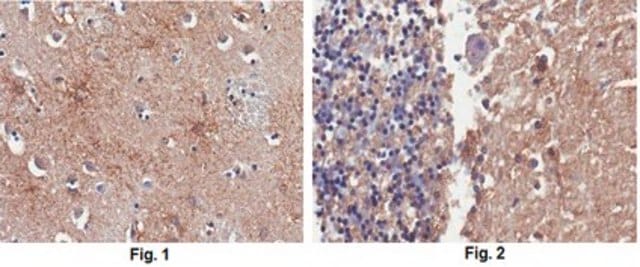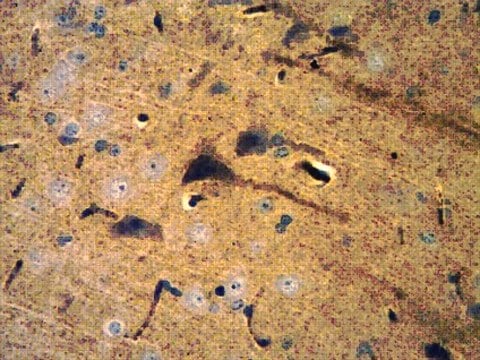推薦產品
生物源
mouse
品質等級
抗體表格
purified immunoglobulin
抗體產品種類
primary antibodies
無性繁殖
3H4.3, monoclonal
物種活性
mouse, rat, human
技術
immunohistochemistry: suitable (paraffin)
western blot: suitable
同型
IgG1κ
NCBI登錄號
UniProt登錄號
運輸包裝
ambient
目標翻譯後修改
unmodified
基因資訊
human ... DLG4(1742)
rat ... Dlg4(29495)
一般說明
Disks large homolog 4 (UniProt: P31016; also known as Postsynaptic density protein 95, PSD-95, Synapse-associated protein 90, SAP-90, SAP90) is encoded by the Dlg4 (also known as Dlgh4, Psd95) gene (Gene ID: 29495) in rat species. PSD95 belong to the family of membrane-associated guanylate kinases (MAGUKs), which also include PSD-93, SAP97 and SAP102. PSD95 is predominantly expressed in the hippocampus CA1 region and prefrontal cortex of the brain, where it localizes in a somatodendritic pattern in the post-synaptic membrane and in presynaptic axon terminals of inhibitory neurons. PDS95 is the major scaffolding protein in the excitatory postsynaptic density (PSD) and a potent regulator of synaptic strength via interactions with a diverse PSD proteins, including NMDA receptors (NMDARs), AMPA receptor (AMPAR) complexes via Stargazin/TARP, adhesion molecules, as well as other scaffolding proteins, such as GKAP and Shank. PSD95 and neuronal nitric-oxide synthase (nNOS) interaction plays a role in maintaining hypersensitivity in acute and chronic pain. The assembly of the GluR6-PSD95-CaMKII complex is reported to mediate injury induced by brain ischemia by facilitating GluR6 serine phosphorylation by CaMKII and the activation of JNK. Overexpression or depletion of DLG4 changes the ratio of excitatory to inhibitory synapses in hippocampal neurons.
特異性
Clone 3H4.3 detects PSD95 in human and mouse brain.
免疫原
KLH-conjugated linear peptide corresponding to 15 amino acids from the N-terminal region of rat PSD95 protein.
應用
Anti-PSD95, clone 3H4.3, Cat. No. MABN1194, is a highly specific mouse monoclonal antibody that targets PSD95 and has been tested in Immunohistochemistry (Paraffin) and Western Blotting.
Immunohistochemistry Analysis: A 1:50 dilution from a representative lot detected PSD95 in human cerebellum, rat cerebellum, and rat brain stem tissues.
Research Category
Neuroscience
Neuroscience
品質
Evaluated by Western Blotting in mouse brain tissue lysate.
Western Blotting Analysis: 0.5 µg/mL of this antibody detected PSD-95 in 10 µg of mouse brain tissue lysate.
Western Blotting Analysis: 0.5 µg/mL of this antibody detected PSD-95 in 10 µg of mouse brain tissue lysate.
標靶描述
~95 kDa observed; 80.46 kDa calculated. Uncharacterized bands may be observed in some lysate(s).
外觀
Protein G purified
Format: Purified
Purified mouse monoclonal antibody IgG1 in buffer containing 0.1 M Tris-Glycine (pH 7.4), 150 mM NaCl with 0.05% sodium azide.
儲存和穩定性
Stable for 1 year at 2-8°C from date of receipt.
其他說明
Concentration: Please refer to lot specific datasheet.
免責聲明
Unless otherwise stated in our catalog or other company documentation accompanying the product(s), our products are intended for research use only and are not to be used for any other purpose, which includes but is not limited to, unauthorized commercial uses, in vitro diagnostic uses, ex vivo or in vivo therapeutic uses or any type of consumption or application to humans or animals.
未找到適合的產品?
試用我們的產品選擇工具.
儲存類別代碼
12 - Non Combustible Liquids
水污染物質分類(WGK)
WGK 1
分析證明 (COA)
輸入產品批次/批號來搜索 分析證明 (COA)。在產品’s標籤上找到批次和批號,寫有 ‘Lot’或‘Batch’.。
Peng Chen et al.
Cell death & disease, 12(4), 403-403 (2021-04-16)
The genes encoding for neuregulin1 (NRG1), a growth factor, and its receptor ErbB4 are both risk factors of major depression disorder and schizophrenia (SZ). They have been implicated in neural development and synaptic plasticity. However, exactly how NRG1 variations lead
Shatrunjai Giri et al.
Journal of neuroscience research, 99(7), 1815-1834 (2021-04-06)
Rapid eye movement sleep (REMS) favors brain development and memory, while it is decreased in neurodegenerative diseases. REMS deprivation (REMSD) affects several physiological processes including memory consolidation; however, its detailed mechanism(s) of action was unknown. REMS reduces, while REMSD elevates
Active Filters
我們的科學家團隊在所有研究領域都有豐富的經驗,包括生命科學、材料科學、化學合成、色譜、分析等.
聯絡技術服務








